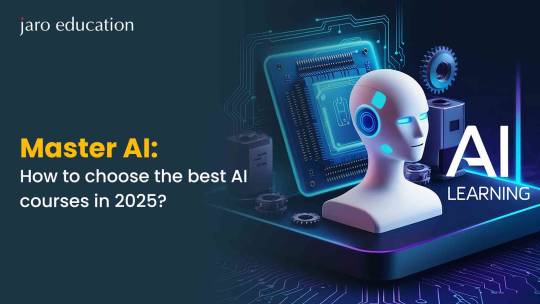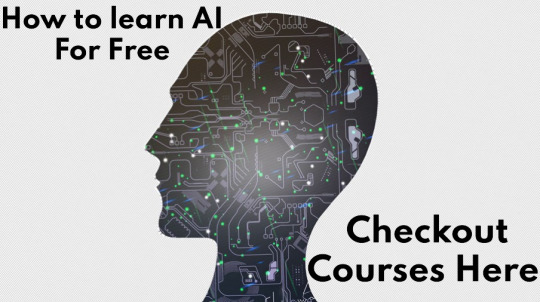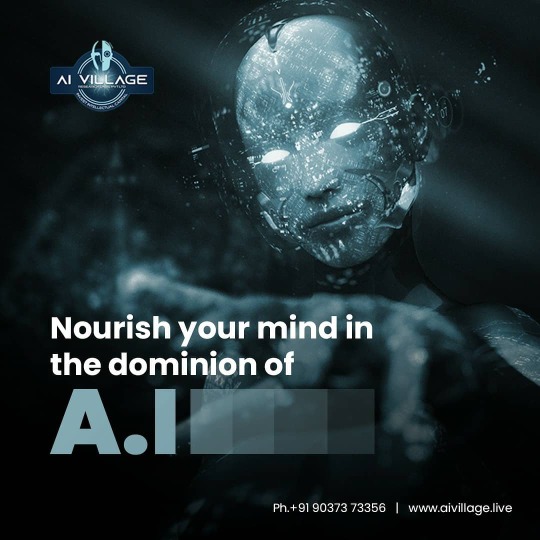#AIOnlineCourse
Explore tagged Tumblr posts
Text

VyTCDC’s AI using Python courses cover a wide range of topics including artificial neural networks, deep learning, and TensorFlow, providing you with extensive knowledge and practical skills. You will learn Python, NumPy, Pandas, Matplotlib, PyTorch, and Linear Algebra—the foundations for building your own neural network. Our instructor-led live online training sessions are recorded so that you can access the videos at your convenience. If traveling is a constraint, jumpstart your career by enrolling in our Artificial Intelligence Online Course today!
#AITraining#LearnPython#OnlineLearning#ArtificialIntelligence#AI#PythonProgramming#TechSkills#ProfessionalDevelopment#Elearn#AIOnlineCourse#TechEducation#SkillUp#AIWithPython#FutureSkills#LearnAndGrow
0 notes
Text
Master AI: How to choose the best AI courses in 2025?
choosing an AI course that caters to the specific needs of the local industry can provide a competitive edge in the job market. Therefore, going through the thousands of AI courses that are up in 2025, what is most likely to shape your successful career path is the number of programs teaching generative AI and machine learning, keeping the Indian market in mind
Read More

0 notes
Text
https://uniathena.com/short-courses/diploma-in-artificial-intelligence?utm_source=SEO&utm_medium=Referral&utm_campaign=SEO_OPBlogSharing_tumblr_12-07-2024&utm_pos=organic&utm_page=login

#ArtificialIntelligence#FreeAICourses#LearnAI#AICertification#AIForBeginners#AIOnlineCourses#AIForFree#TechSkills#AIResearch#AIDevelopment#AIJobOpportunities#AIInnovation#TechEducation#FutureSkills
0 notes
Text
#AIeducation#AIlearning#AItraining#AIonlinecourses#AIforfree#AIforbeginners#AIprogramming#AIcertification#AIcareer#AIcommunity#AItechnology#AIinnovation#AIresearch#AIindustry#AIexperts#AIcurriculum#AIknowledge#AIadvancements#AIapplications#AIdevelopment
0 notes
Text

I have officially reached 200 followers!!!
Thank you all so much for your support and love!!
I literally couldn't have done this without all your reblogs and likes! You all mean the world to me!
Of course special thanks as well to my moots! Love you guys so much 😘💓😍
I know 200 seems like very small but to me it's an amazing accomplishment that I never felt like I deserved. Y'all are the best ❤️
As always I'm tagging all my followers to personality thank you all ❤️💓
@my-abibliophobia @iriska-20 @fallenbluebird @lady-lie @lameass69 @person-of-varying-obsessions @0-cloud-puff-0 @bottlespop @sammygirlypop @peenutbutttaaaaaa @just-duck-it @fuzzynutpizza972 @jm-1981 @armatofu @ghost-girl5 @alastolas @lee642 @maryr1 @siamesekittuh @gigibella @regieluciferi @facehead-08 @deer-genius-idol-unmatched @appleduckslucisdadgodh1h @mentha-vacciniumrainbow @cannibaladhdgirl @mariecherryofficial @kahxeury @starstruckfurrydetective @jennyheather89 @fivvy @nekogamer7 @omniuravity @hell0-itza @larz-barz @jessicanaomia @loremistress-ladybug @aionlinecourse @reassuringbuttpats @adhd-joe @melinack @spookyclownghost @misoosouperrrr @snackypie @valartlover @viktoriacomix @ladyadrasteia666 @super-yoai-lover @shameless-pug @surveyreviews
27 notes
·
View notes
Text

Complete CNN Image Classification Models for Real-Time Prediction - AI Project In the rapidly evolving world of artificial intelligence, Convolutional Neural Networks (CNNs) have emerged as a crucial tool for visual data analysis. The power of CNNs lies in their ability to detect intricate patterns and features within images, making them indispensable for tasks like image classification. Our project, "Complete CNN Image Classification Models for Real-Time Prediction," dives deep into the functionality and application of CNNs, demonstrating how they can be leveraged for real-time image classification tasks.
Understanding CNNs and Their Applications
Convolutional Neural Networks are designed to automatically and adaptively learn spatial hierarchies of features from input images. This makes them particularly effective in identifying and categorizing visual information, from simple shapes and textures to complex structures within images. In our project, we explore how CNNs can be applied to classify images into distinct categories, providing real-time predictions that are not only accurate but also efficient.
The Project Overview
This project serves as a comprehensive guide for anyone looking to understand CNNs and their practical applications. From the foundational concepts to the construction and training of a CNN model, the project walks learners through the entire process of building a CNN for image classification. By the end of the project, participants will have a solid grasp of CNN architecture and the necessary skills to implement CNN models in their own projects.
Real-Time Prediction with CNNs
One of the key highlights of this project is the focus on real-time prediction. Real-time image classification is vital in various fields such as healthcare, security, and autonomous systems, where decisions need to be made swiftly based on visual inputs. The project demonstrates how to train a CNN model that can predict the category of an image almost instantaneously, providing actionable insights in real-time.
Why This Project Matters
This project is not just about learning the theory behind CNNs; it's about gaining hands-on experience with one of the most powerful tools in AI today. By the end of this project, participants will have built a CNN model capable of classifying images with high accuracy, tested on real-world data to ensure its effectiveness. This practical knowledge is invaluable for anyone looking to apply CNNs in their work, whether in academia, industry, or personal projects.
Conclusion
The "Complete CNN Image Classification Models for Real-Time Prediction" project is a gateway to mastering CNNs and their applications in image classification. Through this project, learners gain not only theoretical understanding but also practical experience, empowering them to apply CNNs to solve complex problems in real time. As the field of AI continues to grow, projects like these provide the foundation needed for future exploration and innovation in image analysis. You can download "Complete CNN Image Classification Models for Real Time Prediction Project (https://www.aionlinecourse.com/ai-projects/playground/complete-cnn-image-classification-models-for-real-time-prediction)" from Aionlinecourse. Also you will get a live practice session on this playground.
0 notes
Text

Author: Aionlinecourse
Category: Machine Learning Tutorials
Regression is a powerful statistical technique used to identify the relationship between variables—typically between an independent variable (predictor) and a dependent variable (outcome).
In the realm of machine learning, regression algorithms are applied to datasets to understand how the independent variables influence the dependent variable. This understanding allows us to predict unknown values based on the learned correlations.
Example: Imagine you have a dataset with employee salaries and their years of experience. By applying a regression model, you can establish a relationship between experience and salary, enabling you to predict the salary of employees based on their experience.
How Regression Works
Let’s explore a regression example with a dataset that records house prices (in dollars) against the area (in square meters) in the town of Branalle.
X-axis: Area (Independent Variable) Y-axis: Price (Dependent Variable)
A regression model built on this data will determine the relationship between the area and price. The model's output will be a line on the graph (linear or nonlinear, depending on the algorithm used) that represents the predicted house prices based on their area.
This "prediction line" becomes the basis for forecasting unknown values, such as the price of a house with a given area.
Understanding Regression Tasks
Regression models generate continuous outputs, making them ideal for tasks where the outcome is a continuous variable. For example, if you need to predict house prices from a dataset, this is a regression task, as prices are continuous.
Types of Regression Models
There are several types of regression models used in machine learning, including:
Simple Linear Regression
Multiple Linear Regression
Polynomial Regression
Support Vector Regression
Decision Tree Regression
Random Forest Regression
In future posts, we'll dive deeper into these models and explore how to implement them using Python.
Learn more about regression and other machine learning techniques here.
0 notes
Text
Regression in Machine Learning: An Overview

Author: Aionlinecourse
Category: Machine Learning Tutorials
Regression is a powerful statistical technique used to identify the relationship between variables—typically between an independent variable (predictor) and a dependent variable (outcome).
In the realm of machine learning, regression algorithms are applied to datasets to understand how the independent variables influence the dependent variable. This understanding allows us to predict unknown values based on the learned correlations.
Example: Imagine you have a dataset with employee salaries and their years of experience. By applying a regression model, you can establish a relationship between experience and salary, enabling you to predict the salary of employees based on their experience.
How Regression Works
Let’s explore a regression example with a dataset that records house prices (in dollars) against the area (in square meters) in the town of Branalle.
X-axis: Area (Independent Variable) Y-axis: Price (Dependent Variable)
A regression model built on this data will determine the relationship between the area and price. The model's output will be a line on the graph (linear or nonlinear, depending on the algorithm used) that represents the predicted house prices based on their area.
This "prediction line" becomes the basis for forecasting unknown values, such as the price of a house with a given area.
Understanding Regression Tasks
Regression models generate continuous outputs, making them ideal for tasks where the outcome is a continuous variable. For example, if you need to predict house prices from a dataset, this is a regression task, as prices are continuous.
Types of Regression Models
There are several types of regression models used in machine learning, including:
Simple Linear Regression
Multiple Linear Regression
Polynomial Regression
Support Vector Regression
Decision Tree Regression
Random Forest Regression
In future posts, we'll dive deeper into these models and explore how to implement them using Python.
Learn more about regression and other machine learning techniques here.
0 notes
Text
FYI the blog is @ AIonlinecourse for any of you that wanna preemptively block!
I just had to block an AI learning blog from following my blog 🙃 I do not give consent for my writing to be used as a tool for AI. As do none of these talented writers on this website. AI is BAD and so so gross. You will never ever get heart and soul from a computer that generates art that’s stolen from other artists.
22 notes
·
View notes
Link
RoboGenius provides the best Computer classes for kids between the age of 6 - 18 years old In India, Gurgaon. Learn various modules of online coding , AI, machine learning ( robotics) . Enroll your computer classed for kids today . Read more
1 note
·
View note
Photo

Artificial intelligence (AI) is wide-ranging branch of computer science concerned with building smart machines capable of performing tasks that typically require human intelligence. AI is an interdisciplinary science with multiple approaches, but advancements in machine learning and deep learning are creating a paradigm shift in virtually every sector of the tech industry.
0 notes
Text
VyTCDC’s AI using Python courses cover a wide range of topics including artificial neural networks, deep learning, and TensorFlow, providing you with extensive knowledge and practical skills. You will learn Python, NumPy, Pandas, Matplotlib, PyTorch, and Linear Algebra—the foundations for building your own neural network. Our instructor-led live online training sessions are recorded so that you can access the videos at your convenience. If traveling is a constraint, jumpstart your career by enrolling in our Artificial Intelligence Online Course today!
#AITraining#LearnPython#OnlineLearning#ArtificialIntelligence#AI#PythonProgramming#TechSkills#ProfessionalDevelopment#Elearn#AIOnlineCourse#TechEducation#SkillUp#AIWithPython#FutureSkills#LearnAndGrow
0 notes
Link
AI Online Training is providing the basic knowledge of computer science, natural language processing, python code, math psychology, neuroscience, machine learning, reinforcement learning, inference, learning algorithms, representation, problem solving, computer vision, image analysis and many more.
0 notes
Text
Top AI Courses Online How to Learn Artificial Intelligence for Free

Free Learning: Look for courses that are cost-free.
Expedited Completion: Opt for a course that can be completed quickly.
Reputed Institution: Prefer courses from prestigious universities.
Top Quality Free Online AI Courses
It is important to understand that AI courses differ greatly and focus on different aspects of the field, even for beginners. Choose the AI course that is best for you based on your preferences.
Diploma in Artificial Intelligence
This all-encompassing program is tailored for novices. Diploma in Artificial Intelligence encapsulates foundational concepts requisite for grasping artificial intelligence. The curriculum is concise, enabling completion within a fortnight, while simultaneously imparting advanced AI applications.
Why Opt for This Course: Ideal for those desiring to comprehend AI fundamentals applicable across multiple fields.
Basics of Artificial Intelligence: Learning Models
Basics of Artificial Intelligence: Learnings Models this certification program, developed by Cambridge International Qualifications in the UK, explores a number of AI learning paradigms. Fuzzy Logic, Probabilistic Models, and Deep Learning are among the topics discussed.
Why Opt for This Course: Highly beneficial for AI researchers, developers, or professionals dealing with extensive datasets.
Basics of Artificial Intelligence
Basics of Artificial Intelligence This program, which is another introductory course offered by Cambridge International Qualifications in the UK, looks into the history of artificial intelligence and its potential. The course material is intended to be finished in just six hours.
Why Opt for This Course: One of the finest introductory courses for beginners seeking a rapid overview of AI.
Basics of Agents & Environments in AI
Basics of Agents and Environments in AI This course explains AI basics with an emphasis on intelligent agents. It covers a range of AI-related contexts and include the well-known Turing Test for determining an agent’s level of intelligence.
Why Opt for This Course: Suitable for those wanting a concise course emphasizing agents and environments in AI.
Why Individuals in South Africa Should Undertake These Courses:
Employment Opportunities: Proficiency in AI can help solve unemployment issues by opening doors to profitable work opportunities both domestically and internationally.
Technological Advancement: With AI knowledge, South Africa can become a technology leader in Africa, attracting partnerships and foreign investments.
Problem-Solving Acumen: AI can address regional issues including resource management, climate change mitigation, and wildlife conservation. South Africans with AI skills can create custom solutions tailored to their unique needs.
Conclusion
For those just starting out, these courses are among the best free online resources for learning AI. Each course is accessible via UniAthena and comes with certificates, enhancing your skill set and bolstering your resume for the job market.
#ArtificialIntelligence#FreeAICourses#LearnAI#AICertification#AIForBeginners#AIOnlineCourses#AIForFree#TechSkills#AIResearch#AIDevelopment#AIJobOpportunities#AIInnovation#TechEducation#FutureSkills#AIForSouthAfrica
0 notes
Text
0 notes
Link
Artificial Intelligence (AI) is the capacity of a PC program or a machine to think and learn. It is additionally a field of study which attempts to make PCs "savvy competent". Know more at Artificial Intelligence online training
Benefits of onlineITGuru Free Demo Life time access to the videos Low fee 24x7 Guidance Support. Training by industry experts Live Projects. Resume Preparation. Interview Preparation. Real Time Job Support. contact Information: USA: +1 469 522 9879 INDIA: +91 988 599 1924 , 9550102466. Email: [email protected]
0 notes